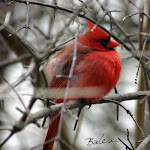
Recently, I posted about finches: house finches, goldfinches, pine siskins and purple finches dying mysteriously here in the Tennessee Valley. (See March 4 posting).
A couple of weeks ago, the Tennessee Wildlife Resources Agency (TWRA) sent some of the dead songbirds to the Southeastern Cooperative Wildlife Disease Study Center in Athens, Ga. for analysis.
“The results of the examination indicated that salmonella poisoning was the cause of death,” announced Scott Dykes, TWRA non-game biologist.
One caller wondered if it was bad seed; but everyone buys their seed from different sources.
Louise Conrad, veterinarian on staff at Ijams Nature Center, says that salmonella is a fecal contaminant. Finches often come to the feeders in groups and can pass the illness from one to another through their droppings, especially on the ground.
To combat the outbreak of salmonellosis, people should keep their feeders clean, periodically washing them in a mild solution of bleach water (one part bleach and nine parts water) or disinfect them often using Clorox Wipes. The bird poop is easy to see. Also, either rake or hose down the ground below the feeder or move it to another location for a while until the problem passes. You can also put up several small feeders and spread them around and for the time being, stop using one large one so that the finches themselves are not able to congregate at one location.
But, be mindful, salmonella can make humans sick too, so use gloves and do not wash birdfeeders in the kitchen sink. Any dead bird found around the feeder should also be promptly buried. (Don’t forget to wear gloves.)
The real mystery to me is why only finches? The titmice, chickadees and wrens that use the same feeders appear to be fine.
Let’s hope it stays that way.
•



































































5 comments:
Just about to finish your book and I wanted to say that I really love it!
Well, anonymous. Thank you.
Writing books is very hard work, the hardest I've ever done. Not as hard as coal mining, but I've never done that.
Often, you stop and ask yourself, "Why am I doing this?" and "will anyone really read it?"
So, thank you again for your kind comment. It truly means a lot.
Hello. So glad to find your blog. We are having the same problem with our finches here in Luray, VA (60 mi west of Washington, DC). It's so devastating to lose so many beautiful birds. We'll forward your informative web page on to our health department here in VA. We'll also follow your suggestions and try to control the problem in our own yard. Keep up the great work. Thank you! Sincerely, Sandria of Luray, VA
It's Sandria again. Do you know how many states are having the same problem. Thank you! Sandria (Luray, VA)
i have noticed several dead pine siskins in the last few months, and i have talked to friends who have found the same thing. I am in Utah, and during the winter i can get 20-30 siskins eating from the feeders! i feel bad that they are dying and i am taking precautions to prevent it.
Post a Comment